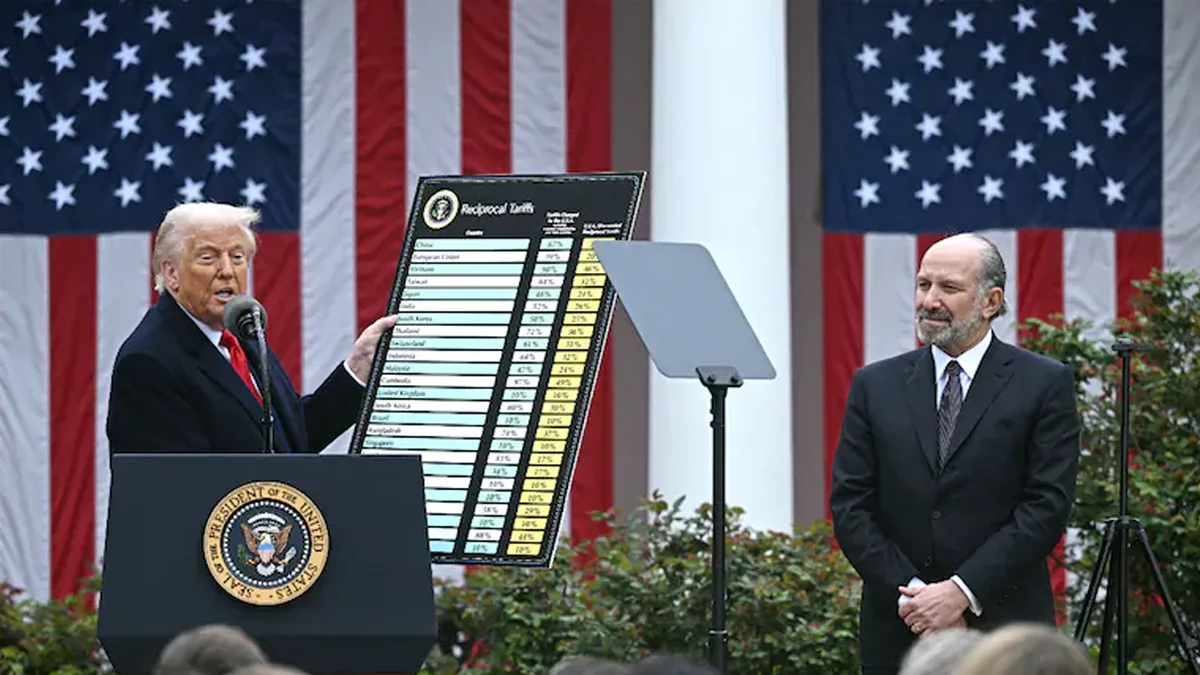Necessary Always Active
Necessary cookies are required to enable the basic features of this site, such as providing secure log-in or adjusting your consent preferences. These cookies do not store any personally identifiable data.
|
||||||
|
||||||
|
||||||
|

The latest sweeping tariffs announced by President Donald Trump have caused carnage in the global stock market as they rippled through early trading in the US, Reuters reported.
Trump’s tariffs on China slammed a wide range of major industries including tech and retail companies. The tariffs could destabilize global trade and unsettle businesses as they dash hopes of attaining business friendly policies under the current US administration.
The new tariffs hit global production hubs hard, further escalating the US-China trade war. Out of the Asian manufacturing hubs targeted by the US, China was hit the hardest with aggregated tariffs reaching 54%. The US further slapped Cambodia with 49% in aggregated import duties while Vietnam and Indonesia were targeted with 46% and 32% respectively.
The impact of the tariffs on the stock market was immediate. Stocks top US retailers that rely on Asian countries like China for supplies dipped by 4% to 6% in pre-market on April 3. The retailers, which include Target, Amazon, and Walmart, may be forced to increase prices. Stocks for major auto companies were also affected with General Motors and Tesla share prices dropping by 2% and 5% respectively.
Apple stocks dropped 6%. Over 90% of the iPhone maker’s manufacturing is based in China, which is among the countries that are most affected by Trump’s tariffs. Analysts project that the new tariffs will have a direct hit on Apple’s gross margins.
“If Apple cannot get exempted this time, and does not pass it through, we estimate about a 9% negative impact to the company’s total gross margin,” Analysts at Citi wrote in a note.
Sportswear retailers were not spared as their Asian suppliers were slapped with high duties. Stocks for Nike and Lululemon dropped by 8.5% and 10.3% respectively.
“With Asia production hubs particularly hit, all footwear and apparel company margins will be affected as costs rise,” Jefferies analysts said in a note.
Trump’s tariffs appear to have spared the semiconductor industry. Although the 10% baseline duties announced by the President could apply to chip imports, analysts say their impact on the industry may not be significant. However, they warn that products like smartphones, computers, and vehicles will be subjected to higher tariffs.
Last year alone, the US imported $82 billion worth of raw chips from Asian countries like Taiwan, Malaysia, and Thailand. This is significantly low compared to PC and server imports that stood at $200 billion. In the same year, the country imported wireless phones valued at $114 billion.
Wall Street reacted to new tariffs with major lenders like Bank of America and JPMorgan Chase dropping 4% and 3% respectively. The US stock futures also dipped 2.8% while the CBOE Volatility Index hit the highest score in three weeks as investors kept off riskier assets. The CBOE Index is also referred to as Wall Street’s fear gauge.
President Trump announced a 10% baseline levy on all US imports. Trump’s tariffs also targeted American allies including Japan, the EU, and South Korea. Taiwan was targeted with a 32% tariff while Japan was slapped with a 24% levy. The EU and South Korea were targeted with 20% and 25% tariffs respectively. Many of these countries have said they’ll reiterate, which analysts say will worsen the situation.
“Retaliation could mean things get worse before they get better. That doesn’t make it any easier for businesses to make clear-cut decisions about major investments in their supply chains, so we can expect volatility to stick around for the foreseeable future,” Equity Analyst at Hargreaves Lansdown Matt Britzman said.
Should countries take retaliatory measures, the tariffs could dent profit margins for companies, disrupt global supply chains, and raise product prices across the world.
“It is hard to imagine how these tariffs would not wreak havoc upon the profit margins of major multinational corporations. Unless something changes, business will retrench, only pursuing necessary projects. This will lead to a larger economic slowdown that will permeate throughout the U.S. economy and likely the global economy,” Chief Market Strategist at Jones Trading, Michael O’Rourke said.